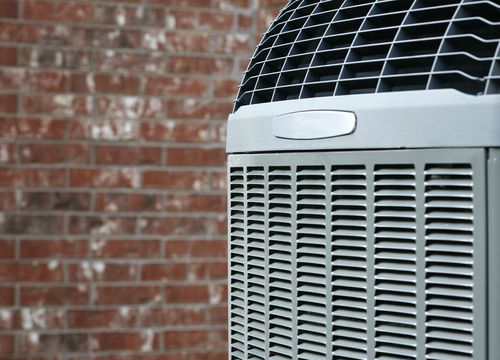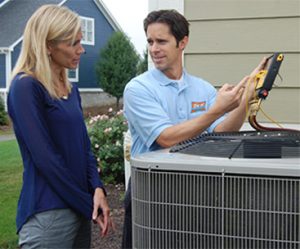

Why does the outside temperature affect your air conditioner?
Your air conditioning system doesn’t actually “cool” the air, but instead it removes heat. During the air conditioning cycle, refrigerant circulates and absorbs heat from inside your home and transfers it outdoors. On those hot summer days your system is under extra stress and has to work overtime to remove the heat from indoors. The hotter it is outside, the more frequently your air conditioner has to run, adding to the wear and tear of your unit.
In extremely hot weather conditions, such as during heatwaves, the outside temperature can rise significantly, causing the air conditioner to struggle to keep up with the cooling demands. This can result in longer cooling cycles, decreased efficiency, and the possibility of the unit not being able to reach the desired indoor temperature.
You won’t have to worry about your air conditioning system as long as it’s well maintained. Below are some tips to keep your A/C running all summer long to help you avoid AC repairs!
What can you do if your air conditioner is struggling on a hot day?
- Check the Thermostat Settings: Ensure that the thermostat is set to the desired temperature and that it is properly functioning. Sometimes, incorrect thermostat settings can lead to inadequate cooling.
- Clean or Replace the Air Filters: Dirty or clogged air filters can restrict airflow and reduce the cooling efficiency of your air conditioner. Check the filters and clean or replace them if necessary. It’s generally recommended to clean or replace the filters every 1-3 months, depending on the manufacturer’s guidelines.
- Clear Obstructions around the Outdoor Unit: Make sure the outdoor unit of your air conditioner is not obstructed by debris, vegetation, or any other objects. Adequate airflow around the unit is essential for its proper functioning. Clear any obstructions and ensure that the unit has proper ventilation.
- Check for Air Leaks: Inspect your home for any air leaks around windows, doors, or ductwork. Leaks can allow hot air from outside to enter your home, making it harder for the air conditioner to cool effectively. Seal any air leaks to improve the efficiency of the cooling system.
- Close Curtains or Blinds: During the hottest parts of the day, close curtains, blinds, or shades on windows that receive direct sunlight. This helps to reduce the heat gain inside your home, easing the workload on your air conditioner.
- Limit Heat-Generating Activities: Avoid using appliances that generate heat, such as ovens, stoves, and clothes dryers, during the hottest parts of the day. This can help reduce the overall heat load on your home and make it easier for the air conditioner to cool the space.
- Consider Using Fans: Use ceiling fans or portable fans to help circulate the cool air throughout your home. Fans can create a wind-chill effect, making you feel cooler without necessarily lowering the thermostat temperature.
- Schedule Professional Maintenance: If your air conditioner continues to struggle, it may be due for professional maintenance. Schedule a service appointment with a qualified HVAC technician to inspect and tune up your system. They can identify any underlying issues and perform necessary repairs or adjustments.
What should you do to maximize your cooling during hot days?
- Replace dirty air filters. While your air conditioner is already working hard on hot days, a dirty filter will force it to work even harder. Check your filters monthly.
- Keep blinds/draperies closed during the day. This is a simple way to limit the amount of heat that gets into your home. Blocking out the sun’s rays makes it easier for your A/C to cool your home.
- Ensure your air vents and registers are open and clear. Your air conditioner is designed to cool a space of a specific square footage. Blocked registers will prevent your system from effectively and efficiently cooling your home.
- Keep windows and doors shut. Open doors and windows allow cool air to escape and warm air to get in. The warm air you just introduced into your home will create additional work for your air conditioning system.
- Use fans. Fans can help circulate air and cool the rooms of your home.
- Mind your outdoor unit! Avoid landscaping with lots of rock or asphalt, which can radiate heat, causing your system to work harder. Keeping your A/C system in the shade will help ease the burden of the summer heat. Also, keep all landscaping at least 2-4ft away from the unit itself to ensure adequate airflow.
- Schedule annual maintenance. The most important step you can take is make sure you have maintenance performed on your system annually. This will ensure that it is working properly and able to handle those hot summer days.
Need AC Service in Utah County or the Salt Lake City Area?
Schedule your annual AC maintenance now before this summer heats up!